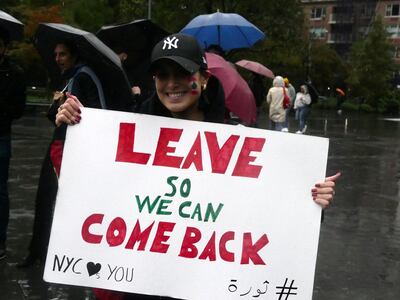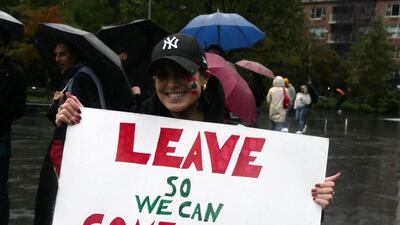Twenty-three-year-old Nai Jammal carried a sign reading “leave so we can come back,” a cry against Lebanon’s ruling elite that deeply resonated with the demands of the young crowd.
Jammal wasn't on the streets of Beirut, Tripoli or Sidon, she was 9,000 kilometres from the epicentre of the week-long protests, in New York's Washington Square Park.
She was one of the hundreds of Lebanese expats and tourists who turned out under the rain to add their voices to the hundreds of thousands across their homeland who have been protesting years of corruption, inefficiency and inequality.
“I grew up in Beirut, studied in Beirut and left to Paris for work. Work eventually took me here, but I would move back to Lebanon immediately if there were job opportunities that paid a liveable wage,” Jammal told The National.

“Everyone is struggling with debt, the country is the third most indebted country in the world but our politicians are insanely wealthy. It’s not fair.”
Like many of her friends and family working abroad, Jammal left Lebanon looking for a future away from a country that she felt lacked opportunities.
However, given the steady decline of the Lebanese economy over the past few years, and the alarming turns over the past few months, the effort to send money back home has grown increasingly futile.
“I came here to finish my education and build my career,” 25-year-old Salma said. “In Lebanon, we don’t have the right resources for me to grow as a therapist. I am in this field because of Lebanon, because I want to serve everyone back home, but home doesn’t have the right resources shape me into the provider I need to be.”
The protests were initially triggered by reports that the state would begin imposing a $6 monthly fee on WhatsApp and internet calls – services widely used to circumvent Lebanon’s notoriously expensive cellular services and particularly crucial for those in the millions-strong Lebanese diaspora to contact home.
But the proposed tax was just the final straw for many after years of increasing unemployment, political inefficiency and corruption that led to the downgrade of Lebanon's credit rating by international agencies earlier this year and a dollar crisis back home.
In September, banks began to limit and even refuse the withdrawal of dollars. The effect on the economy proved to be immediate. Importers warned of shortages of fuel and bread while many rushed to exchange their Lebanese Pounds on the black market for inflated rates.
Chronic economic stagnation, compounded by the state’s inability to provide basic services such as 24/7 electricity, water and internet, have pushed much of Lebanon’s middle and upper-class youth to leave the country.
Accordingly, Lebanon’s educated workforce have left in force for Gulf states and the West.
“The economy in Lebanon is so bad and opportunities for young people are so scarce that we are forced to look for other places to work,” 28-year-old Antonio Gemayel said.
“It was a difficult process trying to get our visas, but finally I was able to get here. I’m trying my best to send money back home in order to support my family, but with all the political corruption that’s happening there, it’s almost a lost cause. Instead, we’re looking to bring everyone here.”
In New York this week, demonstrators carried signs calling for the resignation of the government and criticizing its leaders.
One poster held plane tickets to Paris and Tehran bearing the names the political elites known to have dual citizenship and who have fled Lebanon in previous times of uncertainty.
Between calls for a revolution, protesters hurled insults at Foreign Minister Gebran Bassil in a chant that has gone viral in Lebanon and worldwide among the diaspora. Mr Bassil, the son-in-law of President Michel Aoun, has regularly come under fire for his tone-deaf and racist remarks.
“What we’re seeing is hope and we’ve never seen anything like this,” Anthony Abu Zeid 26, said carrying a Lebanese flag.
“Something is different, the people are fed up, and they cannot handle it. We feel a change is coming, and we’re asking all of them, ‘kiloon ya3ne kiloon’, meaning ‘all means all,’ all politicians resign. We don’t exclude any of these thieves.”
While the weather was grey, Sunday’s demonstration was colourful in spirit and atmosphere.
A dabke circle formed, circling Washington Square Park’s iconic fountain, with a man leading drum in tow.
The crowd itself was as diverse as those taking to the streets in Lebanon. It represented all regions of Lebanon and the crowd was connected by a common desire to see a strong unified country.
Noticeably absent on Sunday were partisan flags or signs.
“I arrived in New York the day the protests started in Beirut,” Joseph Aoun, a 27-year-old Lebanese tourist told The National. Despite it being his first trip to the United States, Joseph said that he was spending much of his vacation watching and reading the news from back home.
“It’s not the most convenient time to be [in New York],” he laughed. “I wish I was there to support the movement and I hope that it achieves the result we deserve.”
The sentiment ran through many of the protestors in the crowd. While many expressed gratitude for having the opportunity to work and study abroad, the urge to immediately return to Beirut and participate in the unprecedented movement was undeniable.
“What’s happening now in Lebanon, the demonstrations, it actually makes me want to go back now,” Ralph Sarkis, 26 said.
“I want to be part of it, but I know that I can’t get up and leave just because there is a smell of a revolution. I’m trying to support as much as I can from here, and I really hope this changes how people think about our leaders and the marriage between sectarianism and the political system in Lebanon.”
Rami Dinnawi, 25, said the situation created by Lebanese leaders had effectively forced people to leave.
“Everyone here is displaced in some way, whether it is because of the economy or because of our choices of lifestyle, we’re here because our government has failed,” he said.

